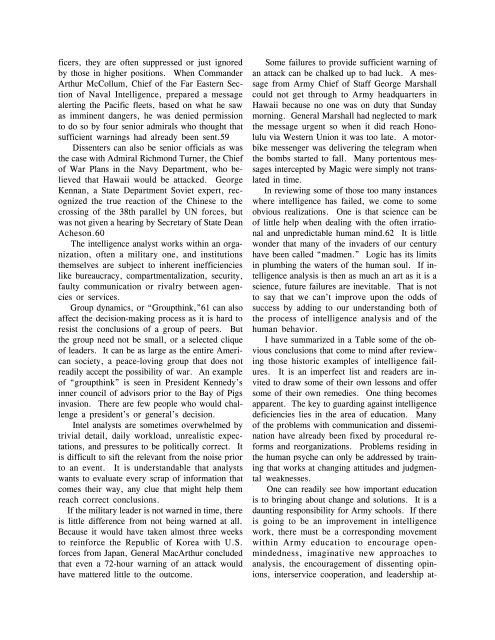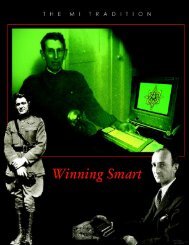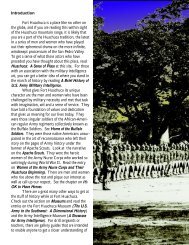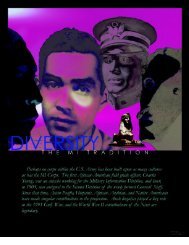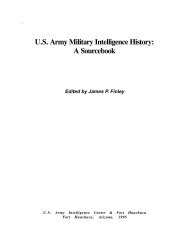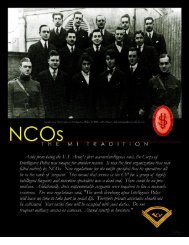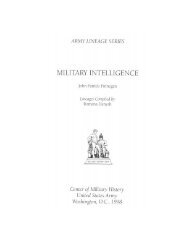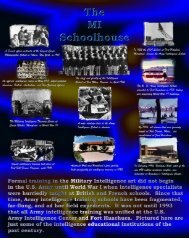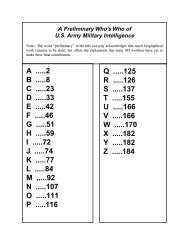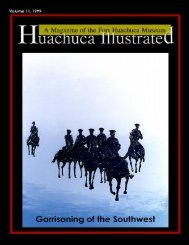The Uncertain Oracle: Some Intelligence Failures ... - U.S. Army
The Uncertain Oracle: Some Intelligence Failures ... - U.S. Army
The Uncertain Oracle: Some Intelligence Failures ... - U.S. Army
- No tags were found...
Create successful ePaper yourself
Turn your PDF publications into a flip-book with our unique Google optimized e-Paper software.
ficers, they are often suppressed or just ignoredby those in higher positions. When CommanderArthur McCollum, Chief of the Far Eastern Sectionof Naval <strong>Intelligence</strong>, prepared a messagealerting the Pacific fleets, based on what he sawas imminent dangers, he was denied permissionto do so by four senior admirals who thought thatsufficient warnings had already been sent.59Dissenters can also be senior officials as wasthe case with Admiral Richmond Turner, the Chiefof War Plans in the Navy Department, who believedthat Hawaii would be attacked. GeorgeKennan, a State Department Soviet expert, recognizedthe true reaction of the Chinese to thecrossing of the 38th parallel by UN forces, butwas not given a hearing by Secretary of State DeanAcheson.60<strong>The</strong> intelligence analyst works within an organization,often a military one, and institutionsthemselves are subject to inherent inefficiencieslike bureaucracy, compartmentalization, security,faulty communication or rivalry between agenciesor services.Group dynamics, or “Groupthink,”61 can alsoaffect the decision-making process as it is hard toresist the conclusions of a group of peers. Butthe group need not be small, or a selected cliqueof leaders. It can be as large as the entire Americansociety, a peace-loving group that does notreadily accept the possibility of war. An exampleof “groupthink” is seen in President Kennedy’sinner council of advisors prior to the Bay of Pigsinvasion. <strong>The</strong>re are few people who would challengea president’s or general’s decision.Intel analysts are sometimes overwhelmed bytrivial detail, daily workload, unrealistic expectations,and pressures to be politically correct. Itis difficult to sift the relevant from the noise priorto an event. It is understandable that analystswants to evaluate every scrap of information thatcomes their way, any clue that might help themreach correct conclusions.If the military leader is not warned in time, thereis little difference from not being warned at all.Because it would have taken almost three weeksto reinforce the Republic of Korea with U.S.forces from Japan, General MacArthur concludedthat even a 72-hour warning of an attack wouldhave mattered little to the outcome.<strong>Some</strong> failures to provide sufficient warning ofan attack can be chalked up to bad luck. A messagefrom <strong>Army</strong> Chief of Staff George Marshallcould not get through to <strong>Army</strong> headquarters inHawaii because no one was on duty that Sundaymorning. General Marshall had neglected to markthe message urgent so when it did reach Honoluluvia Western Union it was too late. A motorbikemessenger was delivering the telegram whenthe bombs started to fall. Many portentous messagesintercepted by Magic were simply not translatedin time.In reviewing some of those too many instanceswhere intelligence has failed, we come to someobvious realizations. One is that science can beof little help when dealing with the often irrationaland unpredictable human mind.62 It is littlewonder that many of the invaders of our centuryhave been called “madmen.” Logic has its limitsin plumbing the waters of the human soul. If intelligenceanalysis is then as much an art as it is ascience, future failures are inevitable. That is notto say that we can’t improve upon the odds ofsuccess by adding to our understanding both ofthe process of intelligence analysis and of thehuman behavior.I have summarized in a Table some of the obviousconclusions that come to mind after reviewingthose historic examples of intelligence failures.It is an imperfect list and readers are invitedto draw some of their own lessons and offersome of their own remedies. One thing becomesapparent. <strong>The</strong> key to guarding against intelligencedeficiencies lies in the area of education. Manyof the problems with communication and disseminationhave already been fixed by procedural reformsand reorganizations. Problems residing inthe human psyche can only be addressed by trainingthat works at changing attitudes and judgmentalweaknesses.One can readily see how important educationis to bringing about change and solutions. It is adaunting responsibility for <strong>Army</strong> schools. If thereis going to be an improvement in intelligencework, there must be a corresponding movementwithin <strong>Army</strong> education to encourage openmindedness,imaginative new approaches toanalysis, the encouragement of dissenting opinions,interservice cooperation, and leadership at-


